Bachelors In Public Health Program Application Tips
Ready to Apply?
Check out some tips below to help strengthen your application
All Saints University College of Medicine receives a high volume of applications per semester. Every submission is evaluated by the Admissions Committee via a holistic approach taking into account academic success as well as extracurricular and personal achievements. Once it has been determined that the applicant meets the academic prerequisites of the university the Admissions Committee will also review the personal statement and recommendation letters. These supporting documents allow the committee to further assess if the applicant has potential for long term success if enrolled at All Saints University College of Medicine. The following tips have been included to guide potential applicants as they plan their personal statement and references.

Personal Statement Tips
Writing your personal statement for the Bachelor of Science in Public Health
All Saints University’s Bachelor of Science in Public Health (BSPH) Program requires prospective applicants to submit a personal statement as part of the application process.
Your personal statement is a chance to make the case that you belong at All Saints University (ASU). Communicating your case clearly and effectively in writing, can be as important as your academic and professional qualifications. Many students get anxious about this portion of the application or worry that their writing skills aren’t up to the task. We encourage you to stay calm, don’t panic, we have some great tips for you. You don’t have to be an outstanding writer to craft a great personal statement. Your task is to provide ASU with the information they’re looking for in 500 – 1000 words. Let’s break the key points down into three specific areas: your past, present, and future.
-
Past: your background in public health
Start by introducing yourself. You’ve already provided a transcript and personal recommendations with your application, so this is an opportunity to put your experience in context. Tell us how and why you became interested in public health, the skills you’ve developed, and what you’re most proud of so far. Don’t be afraid to let your personality shine through!
-
Present: why you are applying to theBSPH at ASU?
After you’ve introduced yourself, explain your motivation for your application. What is driving you to take your career in public health to the next level, and why is the ASU Online BSPH right for you? Make a compelling case why you are applying to this program, specifically, and why now is the right time.
-
Future: goals for your academic activities at ASU and your career beyond graduation
Finally, show that you have a vision for your time at ASU and your post-BSPH career. Include a short statement for a future research project that you would be interested in carrying out as part of your Capstone Project over approximately a three–month period. This gives us more of an idea of your research interests and motivation to undertake the online BSPH program.
One last piece of advice: write an honest statement that gets across your true character and motivations, rather than writing something you think we will want to hear. ASU’s goal in requesting these personal statements is to get to know prospective applicants on a personal level. Focus on providing a clear account of who you are, why you’re applying, and what you plan to do during and after the program.
The BSPH offers the opportunity to get a world-class degree in public health from one of the fine universities in the Caribbean. The program is affordable, flexible, and 100% online. As such, it will attract a diverse, highly qualified group of students from across the globe. With a great personal statement, you can significantly increase your chances of joining the next cohort!
We wish you all the best with the application process, stay encouraged!
Recommendation Letters Tips
Teachers/Professors usually take the writing of recommendation letters very seriously, and they expect students to do the same. Recommendations reflect not just the quality of the student, but also the integrity of the teacher/professor and ultimately the school/university. Note that All Saints University has the opportunity to learn about you through your past academic experiences so a letter of recommendation must be thorough and more than a few sentences in order to be considered a valid reference. So, here are some tips to keep in mind while you seek out faculty and former employers to write a letter on your behalf:
- Choose a faculty member who knows you well, preferably in a variety of contexts. Universities read hundreds of reference letters, most of which are filled with generic praise. Specific reference letters are more likely to get noticed and appreciated. The more a professor/supervisor knows about you, the more specific the letter will be.
- Make a formal request of your teacher/professor (by email or by appointment), asking if he or she would be willing to write a letter or fill out a form on your behalf. Explain the purpose of the recommendation and why you have chosen the teacher/professor. Give them time to consider your request.
- Ask early. Make an appointment to discuss the recommendation at least three weeks in advance of the deadline—preferably a month or more, especially if you need multiple letters. Teachers/Professors have very tight schedules and need ample time to write a thoughtful and distinctive letter.
- Provide information about the program you are applying for. The more teachers/professors know about the position or school you seek to enter, the more easily they can tailor the letter toward a specific audience.
- Provide information about yourself. The more teachers/professors know about your past work, your extracurricular interests, and your aspirations, the more specific they can be about your talents and motivation.
- Double-check that the letter has arrived by the deadline. If not, contact the professor. (Letters are often lost in the mail or in the application shuffle).
- Send the writer a thank-you note. Faculty can spend several hours constructing a single letter; it’s nice to be acknowledged. And let them know whether you got accepted!
2 WAYS TO SUBMIT YOUR RECOMMENDATION LETTERS:
Scanned Copy of a Physical Letter:
- Students may acquire a letter from their referrer and provide a scanned copy by directly uploading it to their online application form
- Scanned letters must meet the following requirements:
- from your teachers or professors, family doctor or someone who knows you in a professional or academic capacity
- letters from family members will not be accepted
- be dated within the last 3 – 6 months
- signed
- addressed to the All Saints University Admission Department
- have the contact information of the referrer
Online ASU SVG Recommendation Submission:
- In place of a scanned physical recommendation letter students can send their referrer our online recommendation form link.
- The referred must fill out the entire form
- Once received by the university, the Admission Committee will contact the referrer to verify the recommendation
LINK TO ONLINE FORM: CLICK HERE
COMMON MISTAKES TO AVOID
- Never assume that the teacher/professor will be willing to write a letter. Always ask first, even if the teacher/professor has written a letter for you in the past. You should also ask for permission to list a teacher/professor’s name as a reference on an application, even if no letter is required.
- Don’t just drop off forms and information with the office assistant or send them as email attachments—meet with the teacher/professor (virtually, set up a zoom, skype or other virtual call to make it personal) to discuss your qualifications, the requirements, and the deadlines.
- If a teacher/professor denies your request, it may sting a little; but don’t assume this means you’re a bad student or bad person. Teachers/Professors may have inadequate experience with you to write an effective letter, or they may have insufficient knowledge about the institution, or they may feel that your skills are better suited to different schools, or career paths.
- Don’t harass teachers/professors about whether they have sent the letter yet, unless they ask you to send a reminder. You may request that the teacher/professor send you an email to confirm that the letter is sent.

